How vaccinated parents can deal with the unvaccinated at school, childcare, parties, sleepovers
Vaccinated Aussie parents face ethical and medical dilemmas when pressured to let their kids play with the unvaxxed. Experts explain how to deal with it.
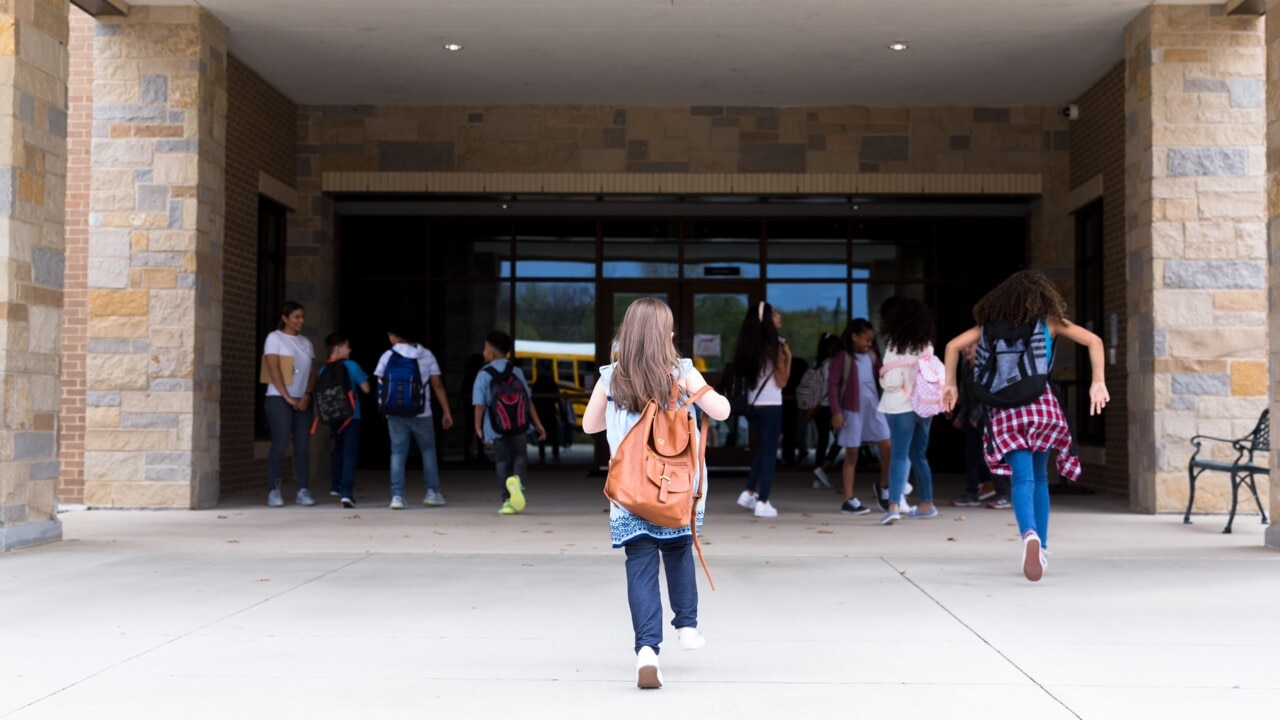
We asked Australian National University infectious diseases expert Professor Peter Collignon, medical ethics and risk communication expert from the University of Sydney Dr Claire Hooker and Child psychologist Dr Ashneeta Prasad for advice on how to navigate dealing with unvaccinated parents post lockdown.
DR CLAIRE HOOKER, A MEDICAL ETHICS AND RISK COMMUNICATION EXPERT FROM THE UNIVERSITY OF SYDNEY
What is your advice in general for parents that have had the vaccine navigating parents that have not had the vaccine?
Having good relationships and being socially included is key to our health and wellbeing, for both parents and children. Your goal in your negotiation is to maintain good relationships with your child’s friends and their friend’s parents – and you should say this upfront: ‘I want you to know that I think it’s really important that our children maintain their friendship, and I’d like to talk about how we can do that, even when I don’t feel safe having someone who isn’t vaccinated in my house.
Children under 12 are not eligible to be vaccinated, and children of any age are not responsible for their parents’ views. If you are angry or upset with people who are not getting vaccinated, you are likely to communicate that you are critical of them – even if you don’t mean to. Your role is to have the maturity to remain calm. Keep the focus on working out safe ways for your kids to maintain their good friendship. It may not seem like it, but responding with empathy will not make vaccine refusal acceptable.
Work out what situations you are comfortable with, and be very specific about these, such as outside only, or in a well ventilated space. Thank the other parents for their understanding of your safety preferences. Be prepared to be the person who questions your own views – just because you are vaccinated, doesn’t mean that your assessment of the risks of meeting on someone’s veranda are necessarily 100 per cent correct.
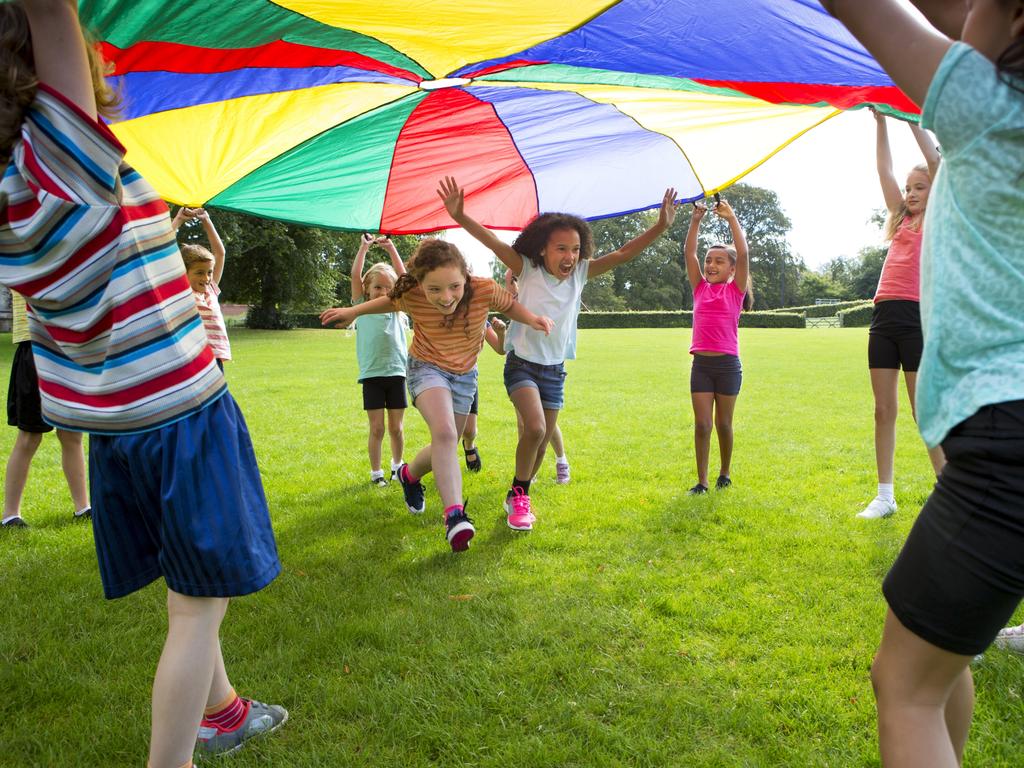
Birthday parties: Is it appropriate to put a note to parents on invitations asking children who have not been vaccinated by choice to please not attend?
No. This will make children from unvaccinated families feel excluded and stigmatised. There are no children who have not been vaccinated by choice – children largely do not make these choices, and children under 12 are not eligible for vaccination.
First, consider holding the party outdoors (perhaps under a shelter such as a gazebo) so that everyone can be included.
Second, if you can, contact the other parents privately, preferably by phone or in person. Say that you hope they will understand that you’re not comfortable hosting children from unvaccinated families at this stage, but their child is an important friend and you don’t want their child to feel left out. Suggest a special birthday playdate outdoors for your two children instead.
By the end of the year, you may be able to politely request that the other child and/or their parents complete a rapid antigen test on the day of the party. Being non judgmental will help this become socially normal.
As a last resort, if you don’t know whether other parents are vaccinating or not and you are worried, you could write on the invitation: ‘We respect your decisions and we ask you to respect that we are comfortable only hosting children from vaccinated families at this stage. If you are not vaccinating, please contact us so we can arrange an alternative small celebration with your child outdoors, so they don’t miss out’.
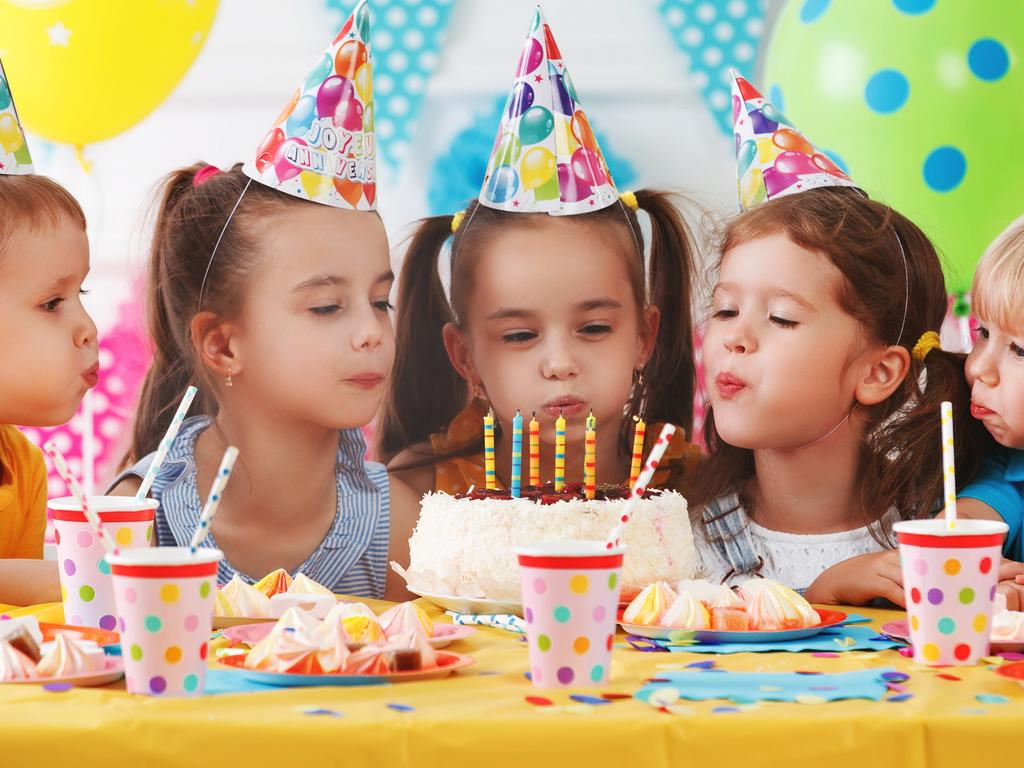
Social media: How do we respond to parents making anti-vax posts on Facebook?
First ask yourself whether it is useful to respond at all. If you do respond, be very, very brief, respectful, calm and factual. Say something simple such as “I respect you and I do not want to upset you, but I do not believe this information to be correct’.
Do not expect to change the opinion of the parent who posted. You could approach them privately and politely and respectfully request that due to the divisiveness of the issue, the parent refrains from posting about vaccination, at least within your common parent circles.
But be aware that this parent is likely to be feeling very defensive at present and is therefore likely to overreact to even very mild and polite comments.
To handle this situation well, you will need to be very calm, be prepared to do a lot of listening and not much talking, and when you do talk, to talk most about what you have in common and what you respect and value in the other parent. Only then can you make a simple and explicit request, such as that both of you agree to refrain from discussing vaccination on Facebook.
Play dates: How do we tell parents our kids cannot mingle because they are not vaccinated without destroying the relationship?
Please don’t say this! Instead, you can be honest and accurate by starting the conversation with your desire not to destroy the relationship: something like, ‘the last thing I want to do is to harm our kids’ friendship’. Explain that you are still preferring to be quite careful about Covid risks and ask to make a time for the kids to mingle safely outside.
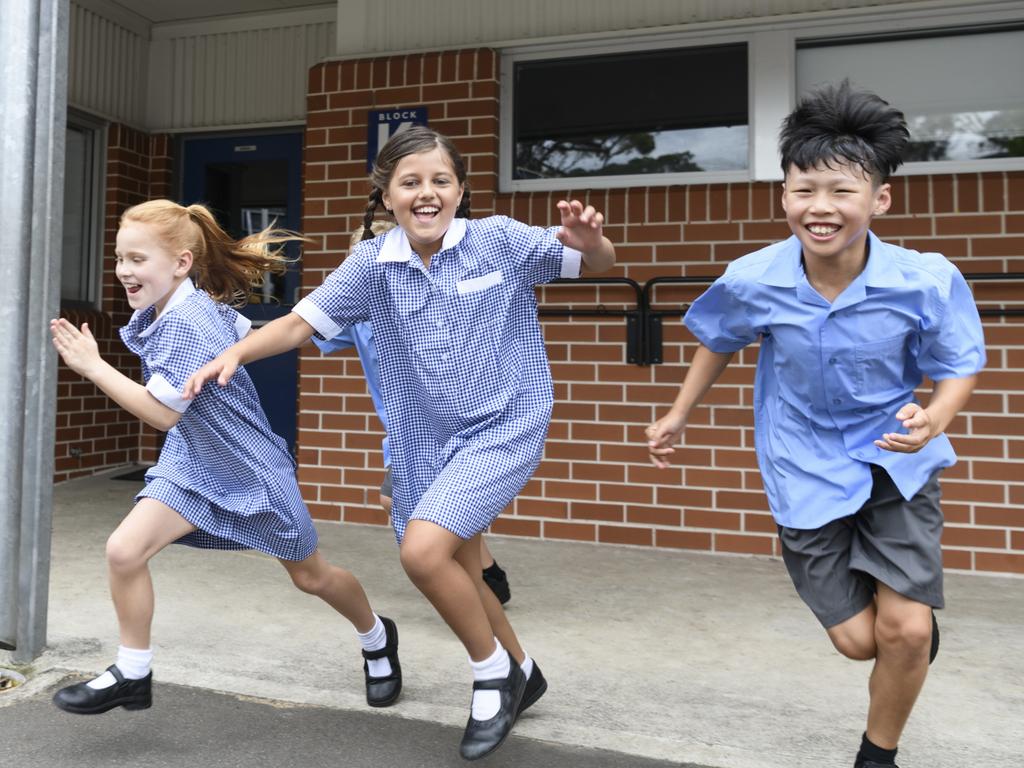
Schools: Is it out of line to ask how many children are vaccinated in my child’s class? (eg, Overseas schools post information on vax rates in each classroom without identifying the students to encourage parents to vax their kids. Should we do the same?)
This is a matter for school and State Department of Education policy.
Such a policy is unlikely to persuade people who are not vaccinating because they are anxious about the current Covid vaccines or about vaccination in general.
A small number of parents who are particularly concerned about Covid, might remove their children from school or change schools on the basis of this information.
Childcare/kinder:Is it unfair to ask that children from unvaxxed families be separated or excluded?
If you are concerned about your child being infected with Covid at preschool, it is best to talk about your worries with the preschool itself.
Ultimately whether ‘No Jab, No Play’ policies will be applied for Covid-19 vaccinations in the future, is for State health officers to decide.
While such a policy will protect some children, it may still be unfair in some ways, because excluding children from preschool education (especially those from disadvantaged backgrounds) can be really harmful for them.
Because young children are not eligible for vaccination at present, it will be some time before such policies can be put in place.
CHILD PSYCHOLOGIST DR ASHNEETA PRASAD
What is the best way to ask the parents of you child’s friends if they are vaccinated?
When initiating these conversations, it can be useful to frame the question within the broader context of why it is being asked.
This could begin with expressing relief that some gatherings are now possible and mentioning how your child has been looking forward to playdates with their friend.
Following this, you could disclose that you may still have lingering concerns about Covid-19 circulating within the community and to keep your family healthy, you have decided that your child can attend playdates with other children provided their parents are vaccinated.
Providing this bigger picture before explicitly asking another parent if they are vaccinated can help ease them into the conversation and promote more open and respectful communication.
How do you explain to them why you don’t want your child to play with their child if the parents aren’t vaccinated?
Be honest and transparent while remaining respectful. Acknowledge that there appears to be a mismatch in how each of your families are managing your approaches to Covid-19.
Try your best to use ‘I’ statements that frame your decision to not allow a playdate as a choice you are making for your family, rather than a consequence of the other parent(s) not being vaccinated.
It is possible that the other parent and/or their child may feel rejected or embarrassed. If possible, acknowledge and validate their feelings (e.g., “I understand if this is upsetting or frustrating for you”), and avoid using blaming or accusatory language which can cause tensions to escalate further.
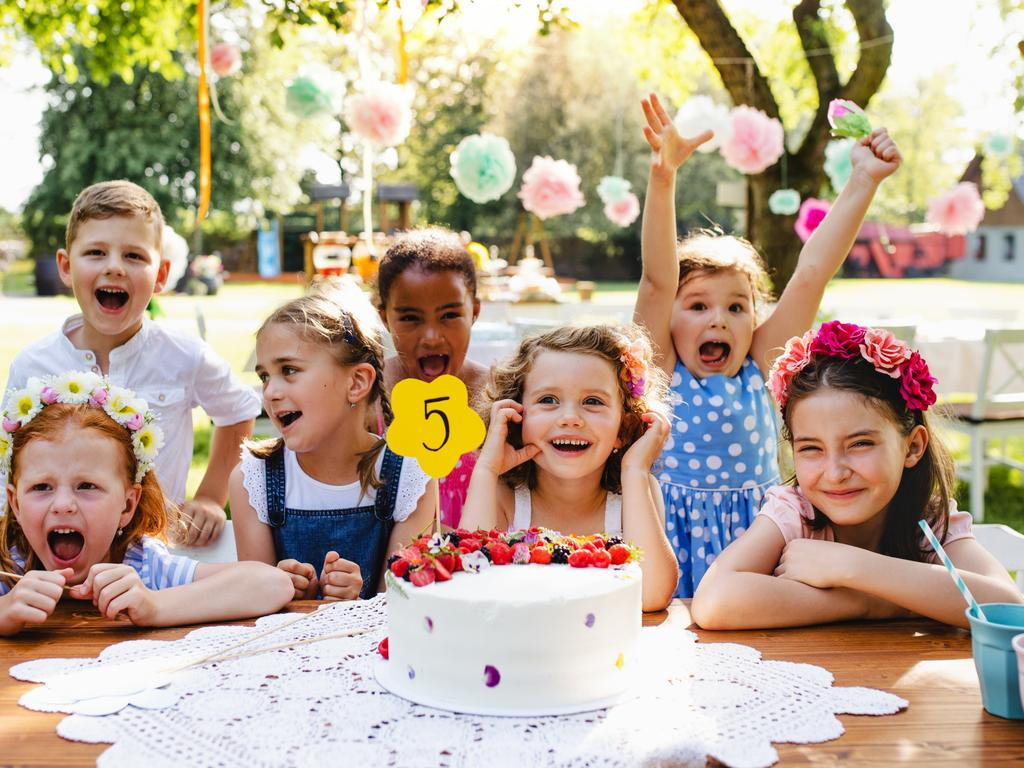
AUSTRALIAN NATIONAL UNIVERSITY INFECTIOUS DISEASES EXPERT PROFESSOR PETER COLLIGNON
What is the risk of children catching Covid?
Since April 2020 one in four Covid cases in Australia have occurred in children aged under 19. Among children aged 0-9 11,982 children have caught Covid. Among children aged 10-19 14,308 children have caught Covid. The younger a child is the less likely they are to get Covid. Data from England, Europe and Canada shows that up to the age of 14 every year you’re younger you have much less chance of infection.
What is the risk of children dying from Covid?
Since April 2020 there have been more than 1278 deaths from Covid in Australia and only one child, a teenager who had another serious infection, has died from the virus.
What is the risk of a child being hospitalised with Covid?
In NSW 314 children have been hospitalised with Covid this year, this represents just 5 per cent of all hospitalisations.
What is the risk of a child with Covid being admitted to ICU in hospital?
In NSW five children aged 0-9 and 21 children aged 10-19 have been admitted to an intensive care unit in NSW with Covid in 2021, this is less than one per cent of all the cases admitted to ICU.

Should you send your children to a birthday party where the host parents are unvaccinated?
Unvaccinated adults are much more of a risk for spreading Covid than unvaccinated children. If hosting or invited to a party, you may want to consider the venue for the party. It will be safer to attend if it is held outdoors.
Should you let your kids play team sport?
Playing team sport outside is much, much safer than sport indoors. Be aware the virus may spread if teammates travel in the car together, or gather in the change rooms together, or attend a social event afterwards. “But actually outside on the field, there is a very low risk that you’ll spread it to other people. It’s not zero but it’s very, very low it’s probably 20 to 50 times lower than being inside,” Professor Collignon said.
Should you send your children to school?
The youngest children are likely to be safest from the virus at school because the younger you are the less likely you are to contract or transmit the infection Professor Collignon said.
“The safer kids to send to school in my view of the kindergarten to third class. The most dangerous children are actually the 16 and 17 and 18-year-olds,” he said.
However, this had to be balanced against the fact older children are doing their Higher School Certificate, he said.
“You don’t want anybody with symptoms at school because there’s no doubt that people with symptoms just spread Covid more than those people without,” he said.
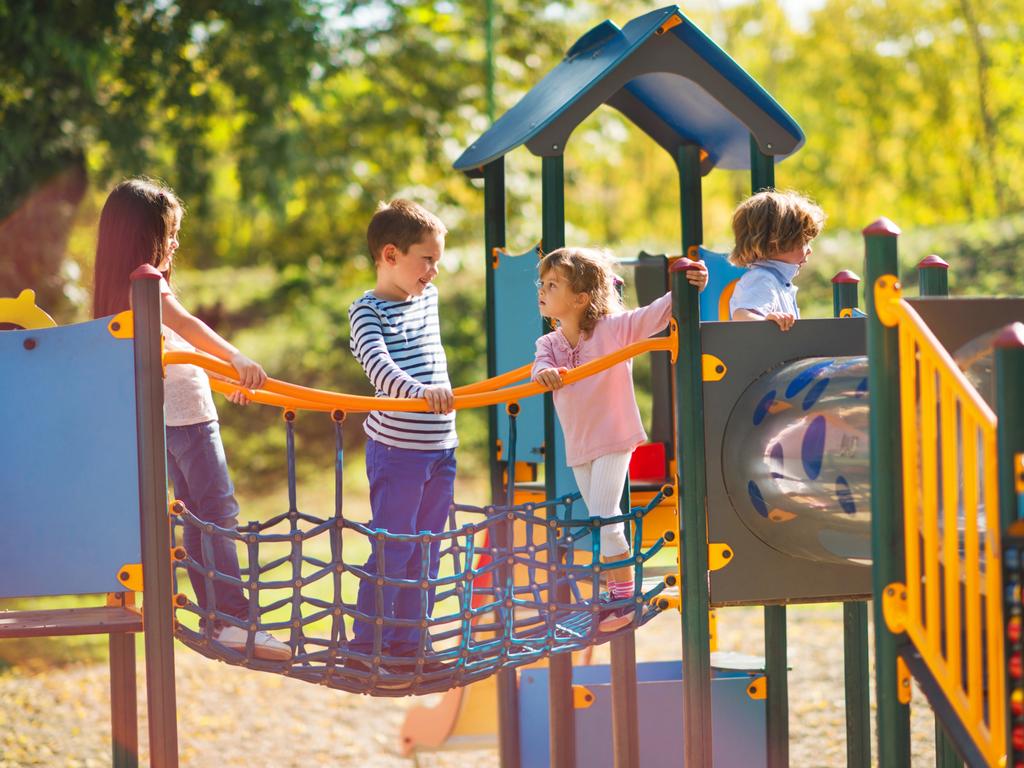
Is it safe for children to play with others on school playgrounds?
School playgrounds are considered a low risk and much better than being in a hall with other children. The more they’re outside versus inside the better.
Should children be made to wear masks?
Insisting children aged under 12 wear masks is difficult and may not be practical, Professor Collignon said.
“Realistically it helps a bit, masks give you about a 20 per cent protection against infection, more when you’re older than younger, that compares to sort of 80- 90 per cent protection from vaccination.”
Having parents and teachers who are vaccinated has more of an effect than mask wearing, he said.
What about sleepovers at a friend’s place?
Sleepovers are probably more dangerous than a barbecue and running around in the playground.
“You wouldn’t want children sleeping over who had symptoms and a sleep over with 10 children will be much worse than a sleep over with two children,” Professor Collignon said
What is the risk of sending your child to childcare?
Again, younger children are at less risk of infection than older children. The risk in childcare is often not from other children but from the adult staff. The centre will be much safer if staff are vaccinated and parents dropping children off are vaccinated.
More Coverage
Read related topics:Explainers




